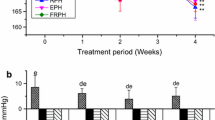Abstract
Background
Inhibition of the angiotensin I-converting enzyme (ACE) is a widely used principle for the treatment of hypertension. Fermentation of milk proteins was shown to lead to the formation of peptides with ACE-inhibiting activity. Milk products with ACE-inhibiting peptides may provide a useful approach to prevent or treat hypertension.
Aim of the study
To investigate the effect of a milk drink supplemented with whey peptides on blood pressure in mildly hypertensive subjects.
Methods
A randomized, placebo-controlled, double blind clinical trial in two parallel groups was performed. A total of 54 hypertensive patients received either 125 ml of a milk drink supplemented with whey peptides every morning or a control product for 12 weeks after a run-in period of 2 weeks. Previous in vitro tests of the whey powder demonstrated ACE-inhibitory activity. Blood pressure was measured at 0, 2, 4, 8, and 12 weeks. Fasting blood samples were collected at 0, 4, 8, and 12 weeks for analysis of metabolic and inflammatory variables.
Results
Resting systolic and diastolic blood pressure values did not change in the milk drink group 144.1 ± 8.6/91.0 ± 5.5 mmHg at baseline vs. 143.7 ± 13.5/90.4 ± 6.5 mmHg after 12 weeks. In the control group systolic (p = 0.0431) and diastolic (p = 0.0081) blood pressure was significantly reduced 140.6 ± 11.7/90.3 ± 5.8 mmHg at baseline vs. 137.0 ± 14.4/87.7 ± 6.6 mmHg after 12 weeks. There was no difference between the two groups at any time point. No changes were seen when the results of the 24-h continuous blood pressure monitoring were compared after 12 weeks. No significant changes were detected for circulating levels of selected inflammation markers (interleukin (IL)-6, C-reactive protein (CRP), number of leukocytes, and plasminogen activator inhibitor-1 (PAI-1) as well as for metabolic variables (insulin, plasma glucose, and lipids).
Conclusions
The daily consumption of 125 ml of a milk drink supplemented with whey peptides was not found to reduce blood pressure and/or inflammation markers in mildly hypertensive subjects, although preceding in vitro tests showed a potent ACE-inhibition.

Similar content being viewed by others
References
Wolf-Maier K, Cooper RS, Kramer H, Banegas JR, Giampaoli S, Joffres MR, Poulter N, Primatesta P, Stegmayr B, Thamm M (2004) Hypertension treatment and control in five European countries, Canada, and the United States. Hypertension 43:10–17
Goldstein LB, Adams R, Becker K, et al. (2001) Primary prevention of ischemic stroke. American Heart Association. Circulation 103:163–182
Abbott RD, Curb JD, Rodriguez BL, et al. (1996) Effect of dietary calcium and milk consumption on the risk of thrombolic stroke in older middle-aged men. The Honolulu Heart Program. Stroke 27:813–818
Yamamoto N, Takano T (1999) Antihypertensive peptides derived from milk proteins. Nahrung 43:159–164
Hata Y, Yamamoto M, Ohni M, Nakajima K, Nakamura Y, Takano T (1996) A study on the effect of sour milk on blood pressure in hypertensive patients. Am J Clin Nutr 64:767–771
Seppo L, Jauhiainen T, Poussa T, Korpela R (2003) A fermented milk high in bioactive peptides has a blood pressure-lowering effect in hypertensive subjects. Am J Clin Nutr 77:326–330
Korhonen H, Pihlanto-Leppala A, Rantamaki P, Tupasela T (1998) The functional and biological properties of whey proteins: prospects for the development of functional foods. Agric Food Sci Finland 7:283–296
Mullaly M, Meisel H, FitzGerald RJ (1997) Angiotensin-I-converting enzyme inhibitory activities of gastric and pancreatic proteinase digest of whey proteins. Int Dairy J 7:299–303
FitzGerald RJ, Meisel H (1999) Lactokinins: Whey protein-derived ACE inhibitory peptides. Nahrung 3:165–167
Meisel H, Schlimme E (1994) Inhibitors of angiotensin-I-converting enzyme derived from bovine casein (casokinins). In: Branil V, Teschemacher H (eds) β-Casomorphins and related peptides: recent development, Weinheim, VCH, Germany
Maruyama S, Nakagomi K, Tomizuka N, Suzuki H (1985) Angiotensin-I-converting enzyme inhibitor derived and enzymatic hydrolysate of casein II. Isolation and bradykinin-potentiating activity on uterus and the ileum of rats. Agric Biol Chem 49:1405–1409
Maruyama S, Mitachi H, Tanaka H, Tomizuka N, Suzuki H (1987a) Studies on the active site and antihypertensive activity of angiotensin I-converting enzyme inhibitors derived from casein. Agric Biol Chem 51:1581–1586
Maruyama S, Mitachi H, Tanaka H, Tomizuka N, Suzuki H (1987b) Angiotensin-I-converting enzyme inhibitory activity of the C-terminal hexapeptide of αs1-casein. Agric Biol Chem 51:2557–2561
Kohmura M, Nio N, Kubo K, Minoshima Y, Munekata E, Ariyoshi Y (1989) Inhibition of angiotensin-converting enzyme by synthetic peptides of human β-casein. Agric Biol Chem 53:2107–2114
Ariyoshi Y (1993) Angiotensin-converting enzyme inhibitors derived from food proteins. Trends Food Sci Technol 4:139–144
Nakamura Y, Yamamoto N, Kumi S, Takano T (1995) Antihypertensive effect of sour milk and peptides isolated from it that are inhibitors to angiotensin-I-converting enzyme. J Dairy Sci 78:1253–1257
Maeno M, Yamamoto N, Takano T (1996) Identification of an antihypertensive peptide from casein hydrolysate produced by a proteinase from Lactobacillus helveticus CP790. J Dairy Sci 79:1316–1321
Hyun CK, Shin HK (2000) Utilisation of bovine blood plasma proteins for the production of angiotensin-I-converting enzyme inhibitory peptides. Process Biochem 36:65–71
Matthews DR, Hosker JP, Rudenski AS, Naylor BA, Treacher DF, Turner RC (1985) Homeostasis model assessment: insulin resistance and beta-cell function from fasting glucose and insulin concentrations in man. Diabetologia 28:412–419
Hansson GK (2005) Mechanisms of disease: inflammation, atherosclerosis, and coronary artery disease. N Engl J Med 352:1685–1695
Acknowledgements
This study was funded by the Unternehmensgruppe Theo Müller, Aretsried, Germany.
We also wish to thank Prof. W. Koenig, University Hospital Ulm, for performing the analysis of CRP.
Author information
Authors and Affiliations
Corresponding author
Rights and permissions
About this article
Cite this article
Lee, YM., Skurk, T., Hennig, M. et al. Effect of a milk drink supplemented with whey peptides on blood pressure in patients with mild hypertension. Eur J Nutr 46, 21–27 (2007). https://doi.org/10.1007/s00394-006-0625-8
Received:
Accepted:
Published:
Issue Date:
DOI: https://doi.org/10.1007/s00394-006-0625-8




